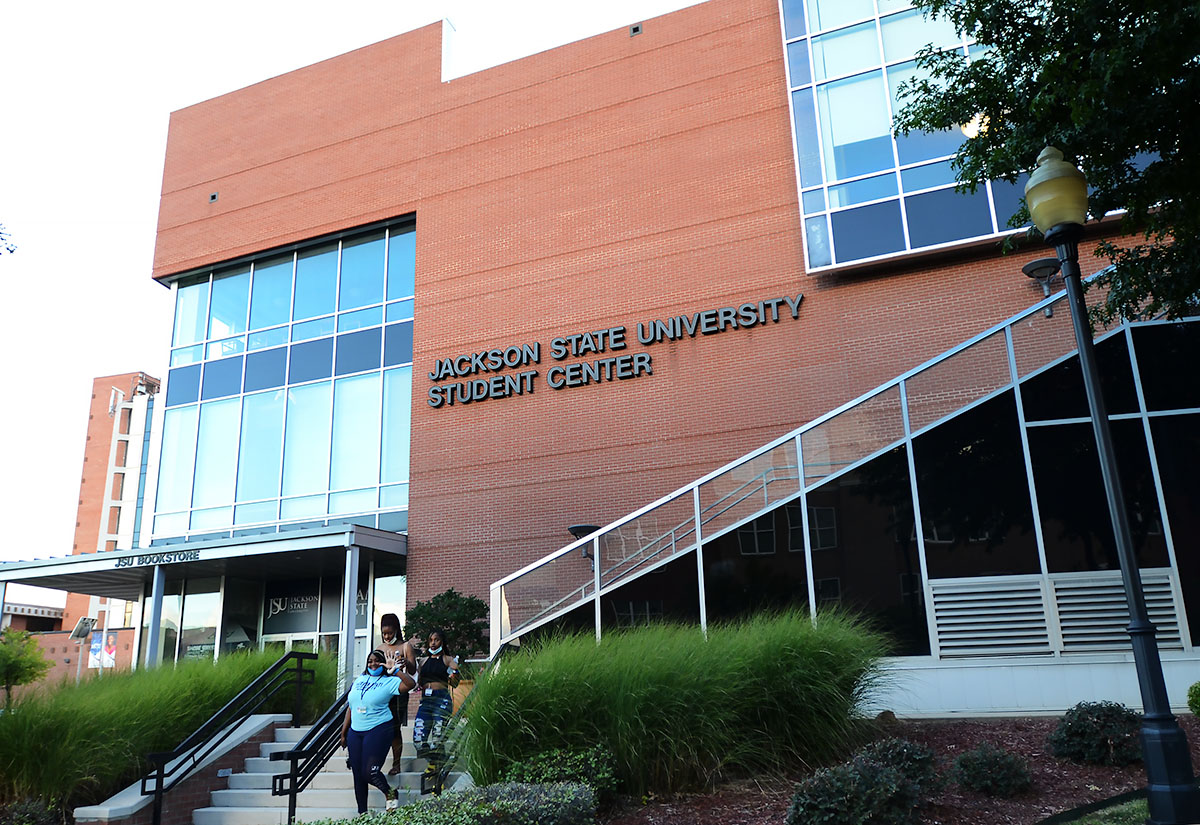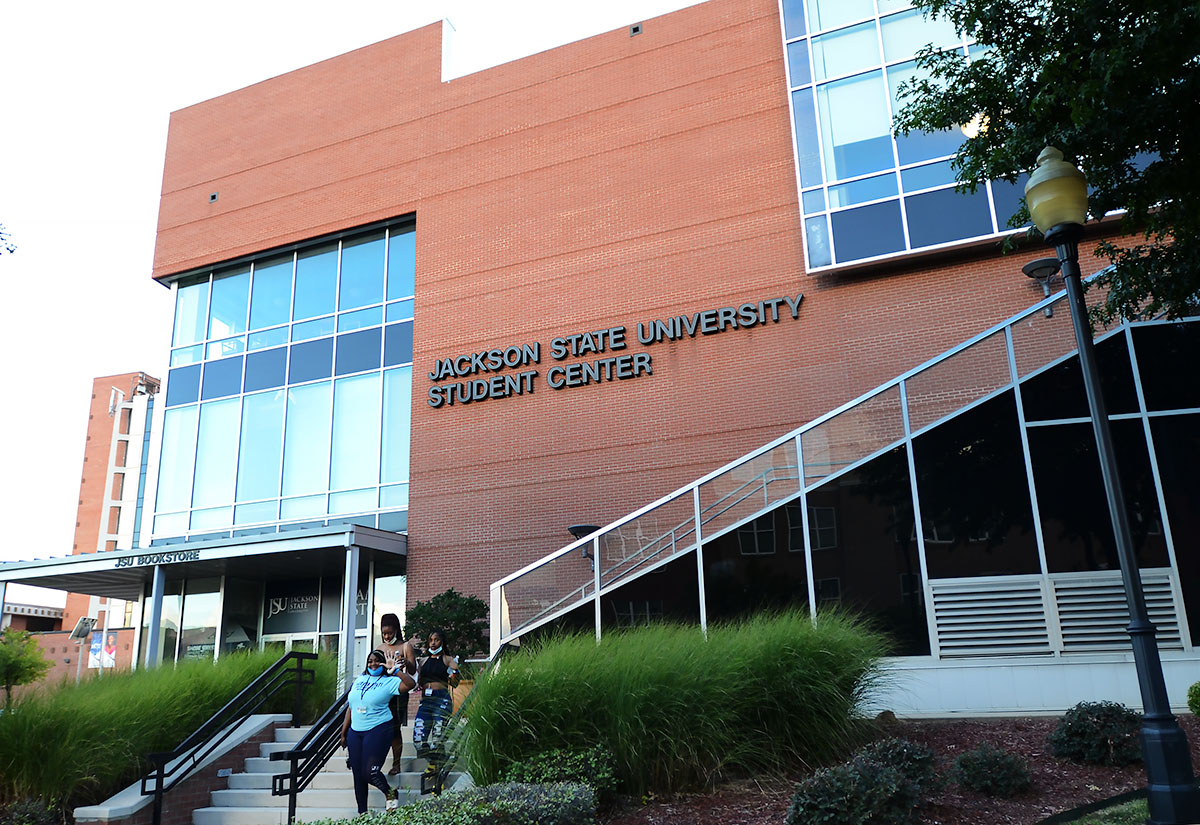Mississippi Today
‘There’s a lot of speculation’: While some in JSU community want more answers after Hudson’s resignation, others say it’s just another chapter closed


‘There’s a lot of speculation’: While some in JSU community want more answers after Hudson’s resignation, others say it’s just another chapter closed
The official announcement Tuesday of Thomas Hudson’s resignation as Jackson State University president drew mixed reaction from students, faculty and alumni.
The 7 p.m. press release from the Institutions of Higher Learning Board of Trustees came on the second day of JSU’s spring break. Many people were confused, but not surprised, by the news, and felt it was the writing on the wall after Hudson was replaced on administrative leave earlier this month.
“When I was told about it last night, I was like, wait, we already knew about that,” said Thomas Kersen, a sociology professor. “But when I stepped back, I was like, yeah that’s a little bit different than him being put on leave.”
So far, a spokesperson for the board had declined to answer questions about the circumstances that led to Hudson being placed on leave, saying only that it was a “personnel matter.” It is unclear if the board will provide more information now that Hudson has resigned, though trustees will discuss “the future leadership of Jackson State” at their regularly scheduled board meeting next week.
Kathy Sykes, a JSU alumnus and former state representative, said the board should tell the community why Hudson resigned as a matter of accountability. Hudson is JSU’s second president in three years; when the board selects his replacement, Sykes said she doesn’t want trustees to make “the same mistake” again.
“There’s a lot of speculation,” she said. “We shouldn’t have to go on speculation. We need the facts … so we can steer away from whatever it is that led to his ouster.”
Other community members are hoping to put this episode in the university’s history behind them.
“That chapter is now closed,” said Don Spann, a visiting assistant professor in the journalism department. “Whatever is this personnel matter, at some point in time maybe it’ll be revealed, but it’s not like I really need to know.”
Spann, a member of the Faculty Senate executive leadership, said he is looking forward to working with Elayne Hayes-Anthony, the former chair of the journalism department who IHL appointed temporary acting president.
“My concern now is how to continue to move Jackson State forward, that’s the most important thing,” he said.
Earlier this year, Spann and other faculty senators voted “no confidence” in Hudson and four members of his administration, citing a “continuous pattern of failing to respect” shared governance and other professional norms of higher education. While Hudson is gone, the four administrators named in the resolution are still at JSU.
It’s unclear if or how Hayes-Anthony will address the faculty senate’s resolution. And it remains to be seen how long she will be in the role. She told students, faculty and members of the media last week that IHL had given her no timetable. Another open question is whether the board will conduct a national search for JSU’s next president or appoint Hayes-Anthony to a more permanent role like it did with Hudson.
Hudson was named acting president in early 2020, then elevated to a more permanent role at the end of that year following an expedited search. A search committee of community members was not appointed for Hudson.
Still, many community members were excited about Hudson at the time. Because he was a JSU alumnus, many felt that his appointment was more appropriate than his predecessor’s (William Bynum). Now some of those same people are unhappy about the abrupt end to Hudson’s tenure.
“I don’t know the details of why he resigned but I’m saddened by it,” said George Flaggs, the mayor of Vicksburg and a prominent alumnus. “I thought he was leading the university in the most progressive way one could.”
A member of the 2017 presidential search committee that protested William Bynum Jr.’s appointment, Flaggs is no stranger to disagreeing with IHL’s decisions.
But in Hudson’s case, Flaggs said he understood the board could not say more about a personnel matter even though he generally believes government bodies in Mississippi should be transparent.
“I trust that those people that are on the College Board are intellectual enough to make a good, common judgment about what’s good for these universities that will continue to allow us to move forward,” Flaggs said. “Now having said that, we cannot and they cannot pick perfect people.”
Many faculty don’t feel that way. They are more distrustful of the IHL board due in part to its history of underfunding historically Black universities in Mississippi.
Kersen said it doesn’t help that the IHL board is secretive about the process it uses to select the presidents. He had opposed Hudson’s appointment because he wanted the board to conduct a full-fledged national search.
“We seem to be in a constant state of confusion about things,” Kersen said. “I just hope one day that we can have more determination in our own fate.”
Though he is frustrated, Kersen said the turnover in leadership has had little effect on his day-to-day work.
“We just make the whole thing work in spite of whatever they (trustees) do,” he said. “Somehow the big machine that is the university just makes do. People do their jobs, more or less. But it has a downturn on morale when you’re not appreciated and when your voice is not heard.”
Sykes said the turnover in leadership hurts JSU’s big-picture goals, like building new dormitories on campus, upgrading its football stadium or becoming the first HBCU to attain top-tier research status.
“I hope that IHL has learned from their past decisions and that they will this time take into strong consideration (what) the other stakeholders, such as the community and alumni, have to say about who’s gonna lead our great institution,” she said.
This article first appeared on Mississippi Today and is republished here under a Creative Commons license.
Did you miss our previous article…
https://www.biloxinewsevents.com/?p=224744
Mississippi Today
On this day in 1977, Alex Haley awarded Pulitzer for ‘Roots’

April 19, 1977

Alex Haley was awarded a special Pulitzer Prize for “Roots,” which was also adapted for television.
Network executives worried that the depiction of the brutality of the slave experience might scare away viewers. Instead, 130 million Americans watched the epic miniseries, which meant that 85% of U.S. households watched the program.
The miniseries received 36 Emmy nominations and won nine. In 2016, the History Channel, Lifetime and A&E remade the miniseries, which won critical acclaim and received eight Emmy nominations.
This article first appeared on Mississippi Today and is republished here under a Creative Commons Attribution-NoDerivatives 4.0 International License.![]()
Mississippi Today
Speaker White wants Christmas tree projects bill included in special legislative session

House Speaker Jason White sent a terse letter to Lt. Gov. Delbert Hosemann on Thursday, saying House leaders are frustrated with Senate leaders refusing to discuss a “Christmas tree” bill spending millions on special projects across the state.
The letter signals the two Republican leaders remain far apart on setting an overall $7 billion state budget. Bickering between the GOP leaders led to a stalemate and lawmakers ending their regular 2025 session without setting a budget. Gov. Tate Reeves plans to call them back into special session before the new budget year starts July 1 to avoid a shutdown, but wants them to have a budget mostly worked out before he does so.
White’s letter to Hosemann, which contains words in all capital letters that are underlined and italicized, said that the House wants to spend cash reserves on projects for state agencies, local communities, universities, colleges, and the Mississippi Department of Transportation.
“We believe the Senate position to NOT fund any local infrastructure projects is unreasonable,” White wrote.
The speaker in his letter noted that he and Hosemann had a meeting with the governor on Tuesday. Reeves, according to the letter, advised the two legislative leaders that if they couldn’t reach an agreement on how to disburse the surplus money, referred to as capital expense money, they should not spend any of it on infrastructure.
A spokesperson for Hosemann said the lieutenant governor has not yet reviewed the letter, and he was out of the office on Thursday working with a state agency.
“He is attending Good Friday services today, and will address any correspondence after the celebration of Easter,” the spokesperson said.
Hosemann has recently said the Legislature should set an austere budget in light of federal spending cuts coming from the Trump administration, and because state lawmakers this year passed a measure to eliminate the state income tax, the source of nearly a third of the state’s operating revenue.
Lawmakers spend capital expense money for multiple purposes, but the bulk of it — typically $200 million to $400 million a year — goes toward local projects, known as the Christmas Tree bill. Lawmakers jockey for a share of the spending for their home districts, in a process that has been called a political spoils system — areas with the most powerful lawmakers often get the largest share, not areas with the most needs. Legislative leaders often use the projects bill as either a carrot or stick to garner votes from rank and file legislators on other issues.
A Mississippi Today investigation last year revealed House Ways and Means Chairman Trey Lamar, a Republican from Sentobia, has steered tens of millions of dollars in Christmas tree spending to his district, including money to rebuild a road that runs by his north Mississippi home, renovate a nearby private country club golf course and to rebuild a tiny cul-de-sac that runs by a home he has in Jackson.
There is little oversight on how these funds are spent, and there is no requirement that lawmakers disburse the money in an equal manner or based on communities’ needs.
In the past, lawmakers borrowed money for Christmas tree bills. But state coffers have been full in recent years largely from federal pandemic aid spending, so the state has been spending its excess cash. White in his letter said the state has “ample funds” for a special projects bill.
“We, in the House, would like to sit down and have an agreement with our Senate counterparts on state agency Capital Expenditure spending AND local projects spending,” White wrote. “It is extremely important to our agencies and local governments. The ball is in your court, and the House awaits your response.”
This article first appeared on Mississippi Today and is republished here under a Creative Commons Attribution-NoDerivatives 4.0 International License.
Mississippi Today
Advocate: Election is the chance for Jackson to finally launch in the spirit of Blue Origin

Editor’s note: This essay is part of Mississippi Today Ideas, a platform for thoughtful Mississippians to share fact-based ideas about our state’s past, present and future. You can read more about the section here.
As the world recently watched the successful return of Blue Origin’s historic all-women crew from space, Jackson stands grounded. The city is still grappling with problems that no rocket can solve.
But the spirit of that mission — unity, courage and collective effort — can be applied right here in our capital city. Instead of launching away, it is time to launch together toward a more just, functioning and thriving Jackson.
The upcoming mayoral runoff election on April 22 provides such an opportunity, not just for a new administration, but for a new mindset. This isn’t about endorsements. It’s about engagement.
It’s a moment for the people of Jackson and Hinds County to take a long, honest look at ourselves and ask if we have shown up for our city and worked with elected officials, instead of remaining at odds with them.
It is time to vote again — this time with deeper understanding and shared responsibility. Jackson is in crisis — and crisis won’t wait.
According to the U.S. Census projections, Jackson is the fastest-shrinking city in the United States, losing nearly 4,000 residents in a single year. That kind of loss isn’t just about numbers. It’s about hope, resources, and people’s decision to give up rather than dig in.
Add to that the long-standing issues: a crippled water system, public safety concerns, economic decline and a sense of division that often pits neighbor against neighbor, party against party and race against race.
Mayor Chokwe Antar Lumumba has led through these storms, facing criticism for his handling of the water crisis, staffing issues and infrastructure delays. But did officials from the city, the county and the state truly collaborate with him or did they stand at a distance, waiting to assign blame?
On the flip side, his runoff opponent, state Sen. John Horhn, who has served for more than three decades, is now seeking to lead the very city he has represented from the Capitol. Voters should examine his legislative record and ask whether he used his influence to help stabilize the administration or only to position himself for this moment.
Blaming politicians is easy. Building cities is hard. And yet that is exactly what’s needed. Jackson’s future will not be secured by a mayor alone. It will take so many of Jackson’s residents — voters, business owners, faith leaders, students, retirees, parents and young people — to move this city forward. That’s the liftoff we need.
It is time to imagine Jackson as a capital city where clean, safe drinking water flows to every home — not just after lawsuits or emergencies, but through proactive maintenance and funding from city, state and federal partnerships. The involvement of the U.S. Environmental Protection Agency in the effort to improve the water system gives the city leverage.
Public safety must be a guarantee and includes prevention, not just response, with funding for community-based violence interruption programs, trauma services, youth job programs and reentry support. Other cities have done this and it’s working.
Education and workforce development are real priorities, preparing young people not just for diplomas but for meaningful careers. That means investing in public schools and in partnerships with HBCUs, trade programs and businesses rooted right here.
Additionally, city services — from trash collection to pothole repair — must be reliable, transparent and equitable, regardless of zip code or income. Seamless governance is possible when everyone is at the table.
Yes, democracy works because people show up. Not just to vote once, but to attend city council meetings, serve on boards, hold leaders accountable and help shape decisions about where resources go.
This election isn’t just about who gets the title of mayor. It’s about whether Jackson gets another chance at becoming the capital city Mississippi deserves — a place that leads by example and doesn’t lag behind.
The successful Blue Origin mission didn’t happen by chance. It took coordinated effort, diverse expertise and belief in what was possible. The same is true for this city.
We are not launching into space. But we can launch a new era marked by cooperation over conflict, and by sustained civic action over short-term outrage.
On April 22, go vote. Vote not just for a person, but for a path forward because Jackson deserves liftoff. It starts with us.
Pauline Rogers is a longtime advocate for criminal justice reform and the founder of the RECH Foundation, an organization dedicated to supporting formerly incarcerated individuals as they reintegrate into society. She is a Transformative Justice Fellow through The OpEd Project Public Voices Fellowship.
This article first appeared on Mississippi Today and is republished here under a Creative Commons Attribution-NoDerivatives 4.0 International License.![]()
-

 Mississippi Today6 days ago
Mississippi Today6 days agoLawmakers used to fail passing a budget over policy disagreement. This year, they failed over childish bickering.
-

 Mississippi Today6 days ago
Mississippi Today6 days agoOn this day in 1873, La. courthouse scene of racial carnage
-

 Local News6 days ago
Local News6 days agoSouthern Miss Professor Inducted into U.S. Hydrographer Hall of Fame
-

 News from the South - Alabama News Feed5 days ago
News from the South - Alabama News Feed5 days agoFoley man wins Race to the Finish as Kyle Larson gets first win of 2025 Xfinity Series at Bristol
-

 News from the South - Alabama News Feed5 days ago
News from the South - Alabama News Feed5 days agoFederal appeals court upholds ruling against Alabama panhandling laws
-

 News from the South - Alabama News Feed7 days ago
News from the South - Alabama News Feed7 days agoBellingrath Gardens previews its first Chinese Lantern Festival
-

 News from the South - Florida News Feed7 days ago
News from the South - Florida News Feed7 days agoSevere weather has come and gone for Central Florida, but the rain went with it
-

 News from the South - Texas News Feed6 days ago
News from the South - Texas News Feed6 days ago1 dead after 7 people shot during large gathering at Crosby gas station, HCSO says















































